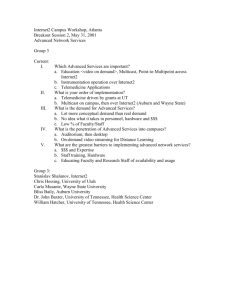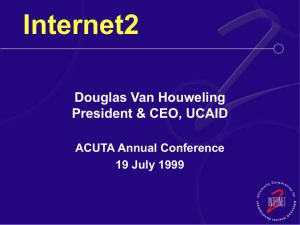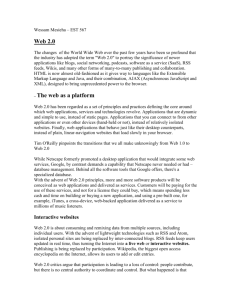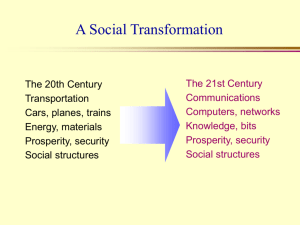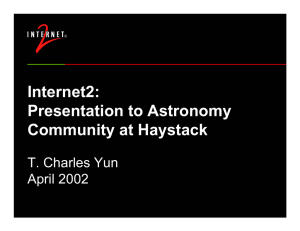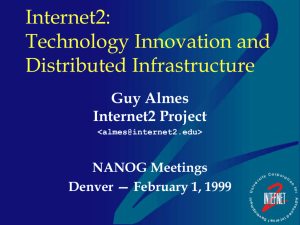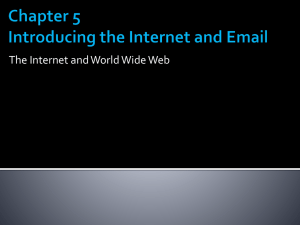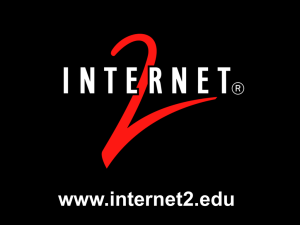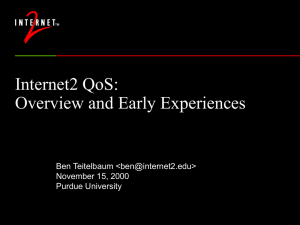Internet2: Implicatons for Higher Education
advertisement
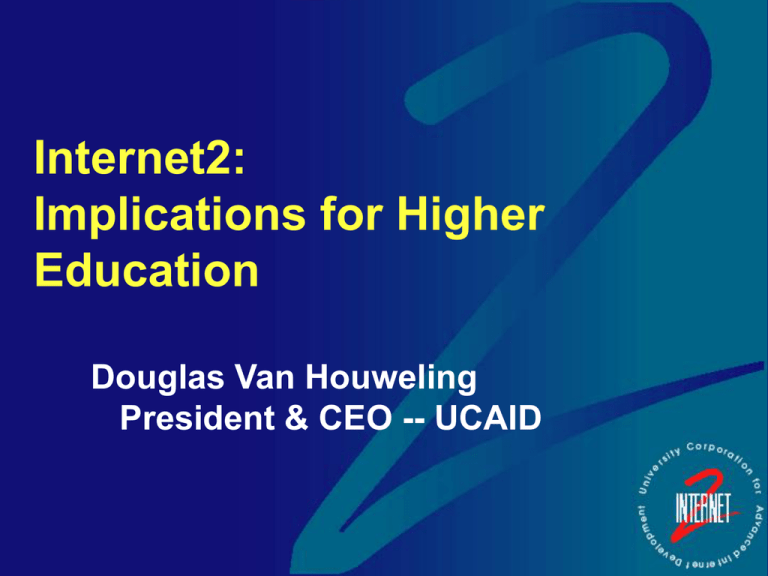
Internet2: Implications for Higher Education Douglas Van Houweling President & CEO -- UCAID Overview History Today’s Internet Barriers to Progress Internet2 Advanced Internet Projects Applications Network Requirements and Abilene Implications Comments & Questions History ARPAnet origins 1987 -- NSFnet • Privatization in 1995 Higher ed planning in 1995/1996 • Are our research and education needs being met by today’s internet? Today’s Internet Growing at 10 - 15% per month Challenges to higher education • The “world wide wait” • Human interaction awkward Virtual meetings and seminars Shared authoring Browsing publications • Distributed large scale computing and data base efforts not feasible Today’s Internet Inadequate for mission-critical applications • Authentication • “Best efforts” not good enough Intranets and Extranets instead • Match capacity and demand • Provide a more secure environment • Don’t reach the public at large, though! Barriers to Progress Providers swamped attempting to match capacity to demand Advanced applications can’t be deployed No large scale development environment available Negative-sum competitive environment inhibits investment Commercialization Privatization 21st Century Networking SprintLink InternetMCI Agency Networks ANS Interoperable High Performance Research &Education Networks ARPAnet Active Nets wireless WDM gigabit testbeds Research and Development NSFNET Quality of Service (QoS) Internet2, Abilene, vBNS ESNET, NREN, DREN Partnerships The Establishment of Internet2 10/96 -- I2 organizing meeting • 34 institutions signed up • Membership commitment $25,000/year in membership dues I2 connectivity and campus upgrades 9/97 -- University Corporation for Advanced Internet Development • Home of Internet2 and Abilene • Offices in Washington, DC and Ann Arbor, MI UCAID Organization & Budget University CEO’s are voting representatives for regular members Structured as an agile organization capable of responding to rapid change. 4 Councils with Board seats • • • • Applications Policy & Operations Network Research Industry Member dues provide income base UCAID Board Chair -- David Ward -- Chancellor, University of Wisconsin/Madison Henry Bienen -- President, Northwestern University William Bowen -- President, Mellon Foundation Molly Corbett Broad -- President, University of North Carolina Larry Faulkner -- President, University of Texas/Austin Steven Sample -- President, University of Southern California Graham Spanier -- President, Penn State University Gary Augustson -- Chair, Network Planning and Policy Council Tom DiFanti -- Chair, Applications Strategy Council Larry Landweber -- Chair, Network Research Liaison Council Doug Van Houweling -- President and CEO Internet2 Project Goals Enable new generation of applications Re-create leading edge R&E network capability Transfer capability to the global production Internet Internet2 Universities 133 as of September 1998 University of Puerto Rico not shown Internet2 Corporate Partners 3Com Lucent Technologies Advanced Network MCI Worldcom & Services, Inc. Newbridge Networks AT&T Nortel Networks Cabletron Systems Qwest Communications Cisco Systems FORE IBM StarBurst Communications Internet2 Corporate Sponsors Bell South Packet Engines SBC Technology Resources StorageTek Torrent Technologies Internet2 Corporate Members Alcatel Telecom Ameritech Apple Computers AppliedTheory Bell Atlantic Bellcore British Telecom Deutsche Telekom GTE Internetworking Hitachi IXC Communications KDD Nexabit Networks Nokia Research Center Novell Pacific Bell RR Donnelley Siemens Sprint StorageTek Sun Microsystems Sylvan Learning Telebeam Williams Communications Internet2 GigaPoPs Advanced Internet Projects Next Generation Internet (NGI) • Focused on: Federal mission agency needs Maintaining US Internet leadership Internet2 • Focused on: Higher education needs Moving the public Internet to the next level Advanced Internet Projects The whole is greater than the sum of the parts • NGI provides partial financial support for university Internet2 projects • Internet2 and NGI coordinate technology development and deployment • Industry has strong incentive to implement resulting capabilities Advanced Internet Benefits Richer content through higher bandwidth • Video, audio • Virtual reality • Dynamic not static More interactivity via minimal delay Reliable content delivery through quality of service model Applications and Engineering Applications Motivate Enables Engineering Internet2 Applications Deliver qualitative and quantitative improvements in the conduct of: • Research • Teaching • Learning Require advanced networking Many Disciplines and Contexts Sciences Arts Humanities Health care Business/Law Administration … Instruction Collaboration Streaming video Distributed computation Data mining Virtual reality Digital libraries … Application Attributes Interactive research collaboration and instruction Real-time access to remote scientific instruments Images courtesy of the University of Michigan Attributes, cont. Large-scale, multisite computation and database processing Shared virtual reality Any combination of the above Images courtesy of Old Dominion University and Univ of Illinois-Chicago American Sign Language and English Captions Gallaudet University Georgetown University Remote Scanning Electron Microscope University of Michigan Philips XL30 Distributed Image SpreadSheet University of MissouriColumbia 3D Brain Mapping: “Watching the Brain in Action” University of Pittsburgh Carnegie Mellon University Pittsburgh Supercomputing Center Upper Atmospheric Research Collaboratory University of Michigan Teleimmersion Shared virtual reality University of Illinois at Chicago Virtual Temporal Bone Images courtesy Univ of IllinoisChicago Globally Interconnected Object Databases California Institute of Technology Real-Time Remote Surgical Collaboration Ohio State University GeoWorlds USC/ISI Middleware Challenges Identify technologies that are scalable and interoperable Increase deployment of middleware technologies as part of a precommercial production environment Examples: • Distributed storage • Video tools • QoS implementation Engineering Objectives Deploy a production network to support applications R&D Establish quality of service (QoS) Support native multicast Establish gigaPoPs as effective service points Abilene Project Complement vBNS Internet2 backbone Provide advanced network testbed Support Internet2 applications development Demonstrate next generation operational and quality of service capabilities Create facilities for network research Abilene Network January 1999 Seattle New York Sacramento Denver Indianapolis Kansas City Los Angeles Atlanta Abilene Router Node Abilene Access Node Operational January 1999 Planned 1999 Houston Abilene Characteristics 2.4 Gbps (OC48) among gigaPoPs, increasing to 9.6 Gbps (OC192) Connections at 622 Mbps (OC12) or 155 Mbps (OC3) IP over Sonet technology Access PoPs very close to almost all of the anticipated university gigaPoPs Abilene Schedule Spring 1998: enrollment discussions with members Fall 1998: Demonstation and preproduction January 1999: Initial group of around 30 members connected 1999: Other members connected as mutually planned International Activities Focus on researcher partnerships working on advanced applications Cooperate on QoS, etc. to maintain global interoperability Use STARTAP (Science, Technology, and Research Transit Access Point) Execute MoU’s with comparable organizations across the globe • • • • Canada Nordic countries Netherlands Others in progress Current Priorities Expand and enhance backbone connectivity Identify and facilitate first phase applications development & deployment Facilitate middleware standardization and implementation Support network research Build international collaboration opportunities Result The Internet and its applications will subsume other services: • • • • • • • • • telephone mail television print news movie rental virtual meetings classroom-based education advertising and sales will be universally accessible Implications From casual & important uses to mission-critical uses From delayed interaction -> immediate interaction From regulated media -> less regulated communication From mass media (munication?) -> personalized communication Interactive electronic communities will proliferate and thrive Trend -Information -> Collaboration Today’s Internet focuses on access to and delivery of information Tomorrow’s Internet will support human collaboration in an information-rich environment The Internet is global, and is creating a global capability to build knowledge-based communities Intangible Value The world is moving from an economy based on tangibles to one based on intangibles • slower growth in physical flows of material goods & products • faster growth of ethereal streams of data, images, and symbols Supporting human interaction less constrained by geography & time Distributed Organizations VISA International The Internet Higher education • The Internet could have scaled nowhere else All created to convey intangible value All dependent on information and flexible interorganizational and interpersonal relationships Implications for an Internet World The future will undoubtedly be different than we and predict, but we can observe a powerful confluence: • intangible value represented in and transportable though information technology • increasing success of distributed global organizations • an Internet designed to support a world built on human collaboration in an information-rich environment Are We Ready? We still think about mass communication, not personal interaction We still measure the economy in terms of tangibles We still assume organizations are hierarchical Can the higher education community provide the model for our future? Are We Ready? The higher education research community is already global But learning is still focused on physical classrooms and “seat time” Knowledge-based enterprises are working to build a global base of human resources • based on lifelong education, not the earlycareer degree program Are We Ready? To build global learning environments around the global R&D communities now being developed? • The global market for highly specialized knowledge may sustain offerings not feasible for even the largest campus • Faculty will need to collaborate in teaching just as they have in research If we don’t, others will Are We Ready? Information technology will provide the capability Faculty will build the research and learning environments Can our institutions support the required organizational & financial innovations? More Info ... www.Internet2.edu DVH@Internet2.edu Doug Van Houweling Internet2 3025 Boardwalk Suite 100 Ann Arbor, MI 48108 +1.734.913.4250
